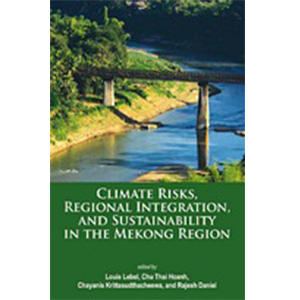Climate Risks, Regional Integration And Sustainability In The Mekong Region
In this book, the Sustainable Mekong Research Network (SUMERNET) brings together multi-country studies, each of which included significant engagement with boundary partners, to analyze the impacts of, and ways to adapt to, climate risks and unsustainable growth in a highly interdependent region.
This book improves our understanding of the linkages between drivers, opportunities, and constraints on the sustainability of the Mekong region’s ecosystems—at the transborder, sub-national, and local levels. Economic integration, urbanization, and climate change have impacts that vary greatly among locations. Hence, one key lesson in this book is that it is important to tailor policies and actions to specific places and communities, paying particular attention to the most vulnerable sections of the population, and the capacities of local actors. These multi-site and -country case studies provide much stronger tests of the merits and limitations of common policies than studies carried out in a single country, underlying the benefits of collaborative research.
RM60.00
Out of stock
Description
In this book, the Sustainable Mekong Research Network (SUMERNET) brings together multi-country studies, each of which included significant engagement with boundary partners, to analyze the impacts of, and ways to adapt to, climate risks and unsustainable growth in a highly interdependent region.
This book improves our understanding of the linkages between drivers, opportunities, and constraints on the sustainability of the Mekong region’s ecosystems—at the transborder, sub-national, and local levels. Economic integration, urbanization, and climate change have impacts that vary greatly among locations. Hence, one key lesson in this book is that it is important to tailor policies and actions to specific places and communities, paying particular attention to the most vulnerable sections of the population, and the capacities of local actors. These multi-site and -country case studies provide much stronger tests of the merits and limitations of common policies than studies carried out in a single country, underlying the benefits of collaborative research.
Publisher: SIRD, SUMERNET & SEI
Paperback
2014
ISBN: 9789670630250






